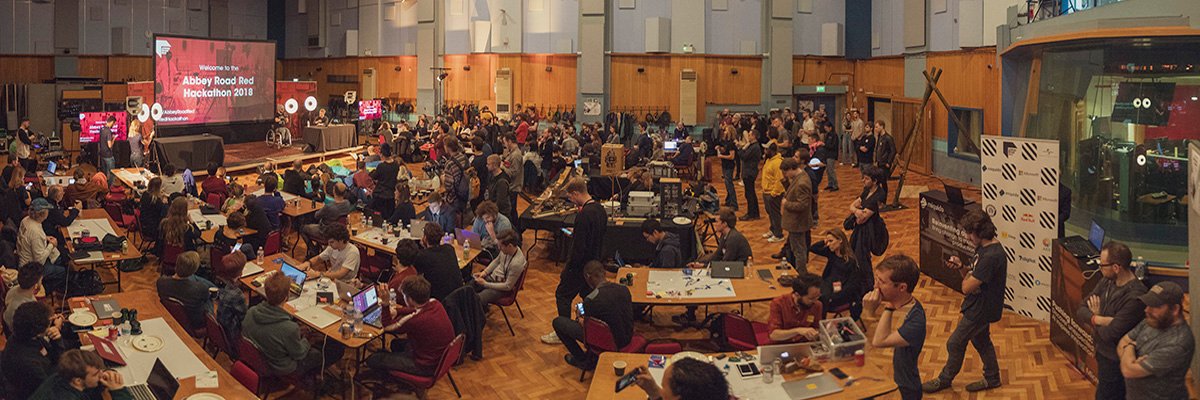Abbey Road Studios holds its first hackathon event to drive musictech innovation
[ad_1]
World-famous Abbey Road Studios, where many of the Beatles’ most popular songs have been recorded, are looking to support musical innovation through technology and recently hosted their first hackathon event.
The studio runs a musictech incubation program called Abbey Road Red. The November event brought together 100 attendees to explore new ways to use technology to create and consume music.
Participants – comprised of programmers, technologists, developers and music producers – were given a number of questions to guide their creations, including “How will artists create music in 2030?” And “Can you play or create music using emotions to trigger different sounds, samples, parameters or effects?”
The teams were supported by Abbey Road engineers and judged by an industry panel made up of judges from Universal Music Group and Abbey Road Studios, as well as Microsoft and Miquido, the official event partners. .
The participants had 24 hours to develop their ideas, and in the end the best two were awarded by the partners.
The Miquido award went to HRMNI, a collaborative musical instrument that allows users to participate in a jam session with their phones, while the Microsoft award went to Rapple, a virtual combat rap opponent.
“One of the main questions of the hackathon was, ‘Could you train the AI [artificial intelligence] play music and jam with you? ‘ Said Kilian Schulze-Forster, one of the team that developed Rapple. “Google has developed a jam bot that can play melodies and we have found an app that turns a short vocal recording into a rap-style song.”
Inspired by these findings, the six-person team (all doctoral students) developed an AI-based rap fight opponent that listens to the user’s words and responds with their own punchlines.
“We focused on rap because it is easier to manage for voice recognition systems than singing vocals. The product idea for an inspiration and lyric writing training tool stems from the fact that we are all musicians and know what it feels like to be stuck writing songs, â€a said Schulze-Forster.
According to Karim Fanous, innovation manager at Abbey Road Red, the hackathon was designed to build bridges between ideas and future technologies in the music industry. “With the hackathon, we wanted to try to foster and explore innovation on a more nascent and fun level – to inspire new developers and artists to inspire us and the music community at large,†he said. -he declares.
An atmosphere of innovation and collaboration is also underlined by Schulze-Forster: “We have learned a lot from the scientists, developers, designers and mentors around us, especially on project management and communication for such an intensive project. Everyone was approachable and happy to help.
“A team has developed a drum computer, which is controlled by the user’s face. You can play a rhythm by moving your mouth, eyes, eyebrows, and so on. It is not only fun, but also an innovative idea as a user interface for people with disabilities who want to play music.
He added that while the entire team are busy with doctorates, they are determined to continue working on Rapple together. “We want to develop it from the current prototype state to a functional product,†he said.
“This includes making his punchlines more meaningful, as well as letting him rap with a nice rhythmic flow. We could imagine making this a long term application and would like to keep in touch with Abbey Road in this regard.
According to Fanous, the hackathon has also been set up so that Abbey Road Red can “explore the level of ‘pre-incubation’ and how we can help.”
“For incubation, [usually] we like startups to have an element of maturity. Ideally, our founders will be close to developing some sort of accessible technology or bringing a product to market – that’s when we can help the most. However, sometimes we worked with founders who had just had an idea, when we believed in their potential to make it happen.
Abbey Road Red runs a six-month incubation program and takes 2% of the capital of participating startups.
“We want to support the music industry with the value we provide to the incubator. We take a very small amount of equity. We are trying to help brilliant founders usher in the next set of technologies universally adopted by the industry, â€Fanous said.
“It’s not about betting on spreads, it’s about researching, learning, thinking about what’s going to have an impact and finding the people who are going to have that impact.”
[ad_2]

